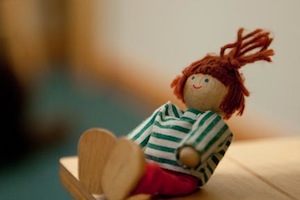Psychotherapy For Children and Adolescents
Treatment aims to restore damaged parent-child relationships.
“What is wrong with my child?”
Does this question refer to:
Passing troubles that you can handle yourself?
A developmental change, such as a toddler or teenager demanding independence?
The child’s reaction to family strains, such as marital tension or an upcoming move?
A chronic problem, for example, friendlessness?
Every situation is different, so I help in different ways. Here are my approaches:
Parent Consultation
Parents talk about their child and together we assess the parents’ and their child’s reactions to developmental steps.
This alone may resolve your concerns. For example, parents might end the toileting wars by helping their child enjoy taking charge of his own body. Or bedtime battles, by helping their child manage nighttime fears. The practical steps are sometimes simple, but parental feelings—about the child’s growing up, earlier regrets with the child, or even their own childhoods—can get in the way. In consultations, parents talk about their child and together we assess their, and their child’s, reactions to developmental steps. Whatever the problem, parents will understand it better, clarify their reactions to it, and learn how to help their child grow through it.
When, however, children can’t use this kind of parental help, we need to find the roadblocks. Consider the second-grader who started throwing tantrums three years after a hospitalization. We wondered: was his defiance a left-over reaction to the illness revealed in his weakness in handling feelings? Had he reverted to magical thinking, believing he had caused his own illness? Was he trying to ward off the terror of falling to pieces? When parent consultation could not answer these questions, we decided to evaluate the child.
Child and Adolescent Evaluation
The evaluation involves the child in the search for growth and self-understanding. Children use talk, art and play to reveal their troubles; together, we look for ways they hide things from themselves.
Here children can talk about themselves and their problems. Even very young children sense why their parents are seeking help, and, when given a chance, will tell the therapist what troubles them. They use talk, art, and play to reveal these troubles. Together, we look for the ways they hide things from themselves. Changing topics, throwing tantrums or bolting for the door—are common distractions from uncomfortable thoughts or feelings. By focusing on such maneuvers, the evaluation opens windows to the child’s mind.
Sometimes the evaluation, which lasts at least three sessions, reveals a normal development; sometimes parental strategies for helping their child; other times, problems to be addressed in child psychotherapy. Whatever its outcome, the evaluation involves the child in the search for growth and self-understanding. As needed, I will refer the child for other evaluations (for example, of speech/language problems or reading disabilities). We then consider all the findings together.
Child and Adolescent Psychotherapy
If indicated, we start psychotherapy. Many adolescents and some school-aged children welcome a place to talk, and their observations are revealing. Younger children express themselves through play. In every case, the child and I watch what happens between us. Some interactions relax the child, others enliven the play, and still others provoke silence or “misbehavior.” Like detectives, we uncover troubling feelings and track down strategies of self-deception. The work of discovery helps the child feel understood; and being understood helps the child build emotional muscle and self-knowledge.
Therapy helps the child feel understood, and being understood helps the child build emotional muscle and self-knowledge.
Individual psychotherapy often helps with:
Anxiety
Depression
Anger and aggression
Severe moodiness
Attention span and impulse control
Conflict with parents, teachers or friends
Friendlessness
Learning problems
Physical symptoms without physical cause
Eating disorders
Sexual or gender issues
Parent Work Continues During Child and Adolescent Psychotherapy
Parent consultations keep everyone on the same page. Although I protect the child’s privacy, I do tell parents the themes of therapy. Parents describe to me their daily family life, and together we discover ways to foster their child’s growth. Parents remain the most important influence on their child, and treatment aims to restore the parent-child relationship. Parents want to find new ways to stay close to their children, while encouraging them to reach beyond the family. Children, especially adolescents, sometimes join parent meetings. Sometimes parents ask for a therapist for themselves; research has shown that the parent’s individual therapy maximizes the child’s therapeutic success.
When Psychotherapy Ends
Psychotherapy begins to end when the child’s development is unlocked. Then we’ll talk about the therapeutic work that remains, and how we’ll say goodbye. Both child and parents will explore their feelings about leaving this valued relationship. After therapy ends, I remain available to the family, always glad to hear news or to consult with parents. Some parents return their child to psychotherapy when the child faces an unexpected challenge or a difficult developmental transition, such as adolescence. No matter how therapy ends, both parents and the child will have learned new skills, learned more about themselves and their strategies of self-deception; and learned how to draw upon this knowledge for the rest of their lives.


